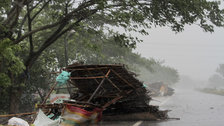
BHUBANESWAR, India, May 3 (Reuters) – A cyclone barrelled into eastern India on Friday, bringing down trees and power lines and “extensively” damaging the tourist town of Puri, but there were no early reports of casualties with a million people evacuated before it made landfall.
Tropical Cyclone Fani spent days building up power in the northern reaches of the Bay of Bengal before it struck the coast of the state of Odisha at around 8 a.m., the state-run India Meteorological Department (IMD) said.
Howling winds gusting up to 200 kph (124 mph) whipsawed trees, uprooting scores, and driving rain impacted visibility, while streets were deserted in the state capital Bhubaneswar and Puri.
“Damage in Puri is extensive, power supply, telephone lines disrupted,” Odisha’s Special Relief Commissioner Bishnupada Sethi told Reuters, referring to the seaside Hindu temple town that is popular with pilgrims and was directly in the storm’s path.
“No causality has been reported so far,” he said.

Cyclone tracker Tropical Storm Risk put Fani as a powerful category four storm on a scale of one to five. The IMD said the storm was weakening.
Close to 60 km (37 miles) inland, winds brought down electricity poles in Bhubaneswar, where authorities had ordered the airport to stay closed. Schools and colleges in Odisha were also shut. A major hospital in the city also suffered extensive structural damage but all patients and staff were safe, authorities said.
People packed into shelters, spreading mats to wait out the storm, television and social media showed.
More than 600 pregnant women were shifted into safe locations, with nearly 500 ambulances on standby. Some 242 medical institutions had been provided with power back-up, government authorities said.
In neighbouring Bangladesh to the north, authorities have begun moving 500,000 people from seven coastal districts, a government minister said. The storm is due to hit late on Saturday.
Odisha had evacuated more than a million people from the most vulnerable communities along the low-lying coast, Chief Minister Naveen Patnaik said on Twitter.
Hundreds of disaster management personnel were deployed in the state, and doctors and other medical staff were told to defer any leave until May 15.
Neighbouring West Bengal also planned to shut down the airport at Kolkata, its state capital.
REFINERY, POWER PLANT OPERATIONAL
Indian Oil Corporation Ltd, the country’s top refiner, said its 300,000 barrels per day (bpd) refinery, its newest facility on the coast of Odisha, had been built to withstand windspeeds of 250 kph and would not halt operations.
However, its 1,500 staff at the refinery were told to stay indoors, a company spokeswoman said.
India’s biggest state-owned oil and gas producer, Oil and Natural Gas Corp Ltd, had shifted people from its rigs off the coast of Andhra Pradesh as a precaution.
A senior company executive in Reliance Industries Ltd , which also runs an oil and gas block adjoining the ONGC block, said the company was following standard operating procedures as prescribed during a cyclone.
State-run power company NTPC Ltd had no plans to shut the 3000-megawatt Talcher power plant in Odisha, its head of operations, Prakash Tiwari, told Reuters.
India’s cyclone season can last from April to December, when severe storms batter coastal cities and cause widespread deaths and damage to crops and property in both India and neighbouring Bangladesh.
But recent technological advances have helped meteorologists predict weather patterns more accurately and prepare.
A super-cyclone battered the coast of Odisha for 30 hours in 1999, killing 10,000 people. In 2013, a mass evacuation of nearly a million people likely saved thousands of lives.
Cyclones typically quickly lose power as they move inland.



